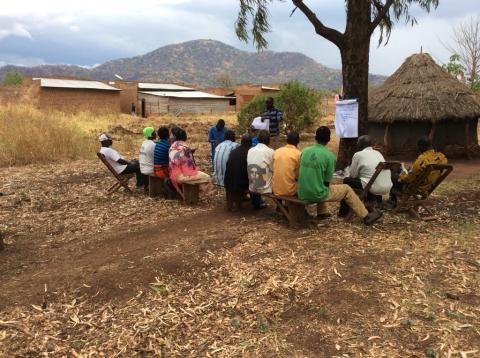In Magwi county, South Sudan, a fragile country torn by an ethnic-based civil war, WPDI youth peacemakers deploy a holistic strategy to help assuage tensions among mutually distrustful communities by tapping on income-generating activities, community dialogues, mediation processes, education and radio talk show to create a culture of peace.
Peace does not just happen – it must be engineered. This is the philosophy James Owet’s learned and now practices with WPDI in his home county of Magwi in the south eastern part of South Sudan. After graduating as a mediator and entrepreneur through our flagship program, the Youth Peacemaker Network (YPN), James went back to Magwi to enroll and train a cadre of local youth and develop with them a farming project to offer tailored products to the community and create job and training opportunities to vulnerable youth. With his team, they decided to create their project across the two payams (subcounty divisions) of Obbo and Lobone where they had found plenty of virgin land to be fertile.
But as they launched their community business mid-2017, James and his team quickly realized that these places were also fertile in tensions among the different clans of the Magwi county. Obbo and Lobone had grown suspicious of each other since the beginning of the civil war in 2013. In the context of a civil conflict espousing ethnic lines, tensions in this county hosting two groups known for their historical territorial dissensions, the Madi and the Acholi, represent a threat to peace they knew they had to address.
To foster reconciliation, our Peacemakers deployed a holistic strategy aiming at promoting peace by engaging communities in a series of peace-building activities. Among these were three community dialogues gathering members of the concerned communities, inviting discussions on peaceful coexistence among the different clans of Magwi County. These dialogue sessions created conditions to initiate mediation processes on specific issues opposing Obbo and Lobone people.
Drawing on our approach that peace is a skill, they also undertook trainings of 46 local people – 37 men and 9 women from Obbo, Lobone and Magwi – to provide them with the tools to enhance the conditions of peace, insisting that youth should take lead in all processes of peace building in their respective communities.
Our peacemakers also managed to conduct two Radio Talk Shows on 93.0 FM Voice of Freedom on peace building and the benefits that the different communities in Magwi could derive from peace. They reached more than 3,500 people with this message on peace and reconciliation in greater Magwi Counties (Magwi, Ayaci and Pageri).
As part of their overall strategy, the peacemakers also organized an event to celebrate International Women’s Day (8 March), gathering more than 1,400 community members – a unique opportunity for WPDI to pass messages on the positive roles of women in peace building and conflict resolution.
They also took critical steps to strengthen a culture of peace in Magwi by meeting with local authorities to explore jointly with WPDI the possibility of teaching conflict resolution in local schools, with the objective of reaching 180 students per year in Magwi. It is also the hope of our peacemakers that, by enrolling some 120 youth from both Obbo and Lobone, their farming community project will eventually create conditions for mutual respect and dialogue.